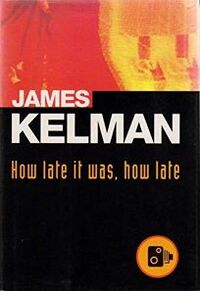Take a photo of a barcode or cover
Written in the vernacular this novel immerses you in the world of Sammy.
While there was criticism of the amount of swearing, it feels right for the character and context.
Loved the read.
While there was criticism of the amount of swearing, it feels right for the character and context.
Loved the read.
I just read this novel for the second time and enjoyed it a lot. The first Kelman book I read was A Dissafection, back when I was on my year abroad in Odessa in 1995. Upon my return I got How Late it Was, How Late and liked it a little better.
The novel is written in the Glasgow dialect, which is very close to the Ayrshire dialect that I grew up with. It's partly the poetry of that language that really appeals to me. Having studied linguistics and socio-linguistics probably makes the book more appealing to me than it might to others, as well as the fact that I do not have any trouble with comprehension (as when I read A Clockwork Orange because I speak Russian - not sure if that spoiled that for me but that's another story for another time).
The story is a slice of life, social realism in great form. It doesn't have a traditional beginning, middle and end, rather it portrays the events that surround the main character, the bold Sammy, over a period of a few days. He gets into a scrape with the sodjers (the police) early on and winds up blind. We then follow his journey through the police cells, the benefits offices, medical assessors and such like.
I would certainly class this novel as literature rather than throwaway. I'm not sure how enjoyable it would be for anyone that struggled with the dialect but I'd be interested to know.
The novel is written in the Glasgow dialect, which is very close to the Ayrshire dialect that I grew up with. It's partly the poetry of that language that really appeals to me. Having studied linguistics and socio-linguistics probably makes the book more appealing to me than it might to others, as well as the fact that I do not have any trouble with comprehension (as when I read A Clockwork Orange because I speak Russian - not sure if that spoiled that for me but that's another story for another time).
The story is a slice of life, social realism in great form. It doesn't have a traditional beginning, middle and end, rather it portrays the events that surround the main character, the bold Sammy, over a period of a few days. He gets into a scrape with the sodjers (the police) early on and winds up blind. We then follow his journey through the police cells, the benefits offices, medical assessors and such like.
I would certainly class this novel as literature rather than throwaway. I'm not sure how enjoyable it would be for anyone that struggled with the dialect but I'd be interested to know.
This is an excellent novel (don’t take it from me – it won the Booker Prize) about a lowlife drunk and the indignities he suffers trying to get welfare. That it’s written in an accent would usually get on my nerves fast, but Kelman is simply too good. Here’s how it starts: “Ye wake in a corner and stay there hoping yer body will disappear, the thoughts smothering ye; these thoughts; but ye want to remember and face up to things, just something keeps ye from doing it, why can ye no do it; the words filling yer head: then the other words; there’s something wrong; there’s something far far wrong; ye’re no a good man, ye’re just no a good man.”
This took me a while to get into but it carries you along, in the tirade against a blank wall of a system.
Pearl Ruled (p53)
It's my mood. I'm sure it's my mood. The dialect is actually really involving as a means to convey the character's emotional reality. The structure of the narrative is beautifully used. The 1994 Booker was well awarded indeed.
But Sammy (PoVman) is working. my. nerve.
I cannay see. is the precise moment where I just...I can't...I can not deal with this shithead one more second. I want to enter the book's reality with a truncheon and a hangover and just wail on this nasty, ignorant, testosterone-poisoned public menace. Maybe one day...
...who am I kidding, I will not live long enough to voluntarily return to the company of this ghastly low-class low-brow shit.
It's my mood. I'm sure it's my mood. The dialect is actually really involving as a means to convey the character's emotional reality. The structure of the narrative is beautifully used. The 1994 Booker was well awarded indeed.
But Sammy (PoVman) is working. my. nerve.
I cannay see. is the precise moment where I just...I can't...I can not deal with this shithead one more second. I want to enter the book's reality with a truncheon and a hangover and just wail on this nasty, ignorant, testosterone-poisoned public menace. Maybe one day...
...who am I kidding, I will not live long enough to voluntarily return to the company of this ghastly low-class low-brow shit.
How Late it Was, How Late is about a Glaswegian man who, having gone out and got drunk and ended up getting a beating from the police, wakes up in a police cell to discover that he's gone blind. It's written entirely in the Scots dialect and in a stream of consciousness style with no breaks for different chapters. It's mostly first person, as told by the unfortunate Glaswegian, Sammy, but Sammy gets confused and sometimes switches to third person. It could not be praised for its readability.
It's easy to see why this is the most controversial winner of The Booker Prize. The choice of character and the swearing used as punctuation, as is common in Glasgow, would not appeal to the typical literary snob who would rather be reading lengthy fan-fiction about Thomas Cromwell to help them to validate their Oxbridge degree (Disclaimer: I've never read Wolf Hall. I'm sure it's lovely). However, it's one of the most perfect character studies I've ever read and it's clearly influenced many Scottish writers who followed. Irvine Welsh is the most obvious example but his influence is also clear in the book I'm reading right now by Janice Galloway.
It's a gloriously bleak story too. I like bleak stories but they can't be comical, they mustn't stray into the ridiculous. This one works because it's so possible. It's so likely that I'm sure I've met many iterations of Sammy The Drunk Glaswegian, stumbling out of pubs and slumped in bus stops. When you're reading the book it makes you wonder how many people you've spoken to who live lives like this one. So the horrible situations Sammy finds himself in become that little bit darker. Somehow, Kelman then pulls off them impossible and manages to make it funny.
It's a strange version of the unreliable narrator too. When Sammy pulls you into the immediate present, for example when he's in conversation with someone, you read what he literally says to that person at that time. When the conversation is over, you read what he was actually thinking. Then later on he might change his mind. Or forget something else, or remember a new detail. You're in his head, so he can't deliberately mislead you, but he's so confused and so easily distracted that you can't really consider him a reliable narrator either.
It's an intense and visceral novel and, as awful as Sammy can be I found myself rooting for him. He makes terrible decisions but he's not an intrinsically evil character and is more of an unfortunate underdog. It's hard to not like him. Nevertheless the book left me a little drained and while it made me want to go and find the rest of Kelman's work, I might have a bit of a rest first.
It's easy to see why this is the most controversial winner of The Booker Prize. The choice of character and the swearing used as punctuation, as is common in Glasgow, would not appeal to the typical literary snob who would rather be reading lengthy fan-fiction about Thomas Cromwell to help them to validate their Oxbridge degree (Disclaimer: I've never read Wolf Hall. I'm sure it's lovely). However, it's one of the most perfect character studies I've ever read and it's clearly influenced many Scottish writers who followed. Irvine Welsh is the most obvious example but his influence is also clear in the book I'm reading right now by Janice Galloway.
It's a gloriously bleak story too. I like bleak stories but they can't be comical, they mustn't stray into the ridiculous. This one works because it's so possible. It's so likely that I'm sure I've met many iterations of Sammy The Drunk Glaswegian, stumbling out of pubs and slumped in bus stops. When you're reading the book it makes you wonder how many people you've spoken to who live lives like this one. So the horrible situations Sammy finds himself in become that little bit darker. Somehow, Kelman then pulls off them impossible and manages to make it funny.
It's a strange version of the unreliable narrator too. When Sammy pulls you into the immediate present, for example when he's in conversation with someone, you read what he literally says to that person at that time. When the conversation is over, you read what he was actually thinking. Then later on he might change his mind. Or forget something else, or remember a new detail. You're in his head, so he can't deliberately mislead you, but he's so confused and so easily distracted that you can't really consider him a reliable narrator either.
It's an intense and visceral novel and, as awful as Sammy can be I found myself rooting for him. He makes terrible decisions but he's not an intrinsically evil character and is more of an unfortunate underdog. It's hard to not like him. Nevertheless the book left me a little drained and while it made me want to go and find the rest of Kelman's work, I might have a bit of a rest first.





